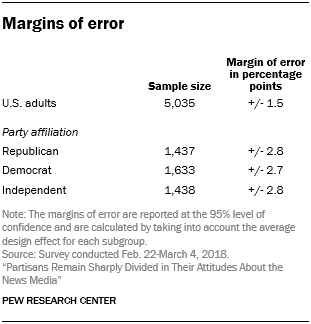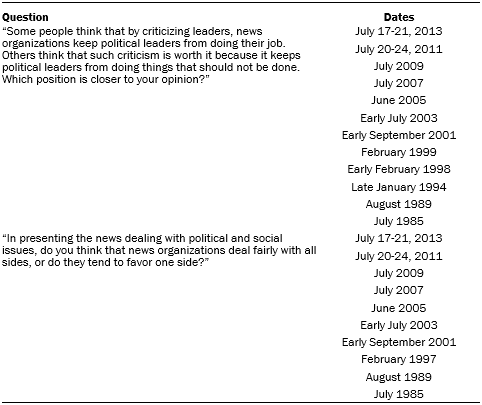The analysis in this report is based on a nationally representative survey conducted from Feb. 22 to March 4, 2018, among 5,035 U.S. adults ages 18 years or older. The margin of error for the full sample is plus or minus 1.5 percentage points. This report was made possible by The Pew Charitable Trusts, which received support from the John S. and James L. Knight Foundation, the Ford Foundation, Bill & Melinda Gates Foundation and the Open Society Foundations. Support for the research is part of Knight Foundation’s Trust, Media and Democracy initiative, which aims to strengthen the role of strong, trusted journalism as essential to a healthy democracy.
The survey was conducted by the GfK Group in English and Spanish using KnowledgePanel, its nationally representative online research panel. KnowledgePanel members are recruited through probability sampling methods and include those with internet access and those who did not have internet access at the time of their recruitment (KnowledgePanel provides internet access for those who do not have it, and if needed, a device to access the internet when they join the panel). A combination of random-digit-dialing (RDD) and address-based-sampling (ABS) methodologies have been used to recruit panel members (in 2009 KnowledgePanel switched its sampling methodology for recruiting members from RDD to ABS).
KnowledgePanel continually recruits new panel members throughout the year to offset panel attrition as people leave the panel. All active members of the GfK panel were eligible for inclusion in this study. In all, 8,066 panelists were invited to take part in the survey. All sampled members received an initial email to notify them of the survey and provided a link to the survey questionnaire. Additional follow-up reminders were sent to those who had not responded as needed.
The final sample of 5,035 adults was weighted using an iterative technique that matches gender, age, race, Hispanic origin, education, region, household income, home ownership status and metropolitan area to the parameters of the Census Bureau’s March 2016 Current Population Survey (CPS). This weight is multiplied by an initial sampling or base weight that corrects for differences in the probability of selection of various segments of GfK’s sample and by a panel weight that adjusts for any biases due to nonresponse and noncoverage at the panel recruitment stage (using all of the parameters described above).
Sampling errors and statistical tests of significance take into account the effect of weighting at each of these stages.
The table shows the unweighted sample sizes and the error attributable to sampling that would be expected at the 95% confidence level.

Sample sizes and sampling errors for other subgroups are available upon request.
In addition to sampling error, one should bear in mind that question wording and practical difficulties in conducting surveys can introduce error or bias into the findings of opinion polls.
Pew Research Center is a nonprofit, tax-exempt 501(c)(3) organization and a subsidiary of The Pew Charitable Trusts, its primary funder.
The dates of the web surveys for the 2016 and 2017 trends are Jan. 12-Feb. 8, 2016, and March 13-27, 2017. The following table shows the dates for the phone trends for the watchdog role and news media fairness questions.

© Pew Research Center, 2018




